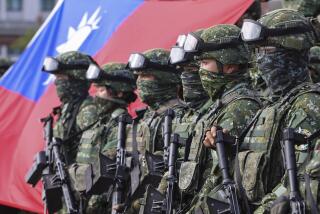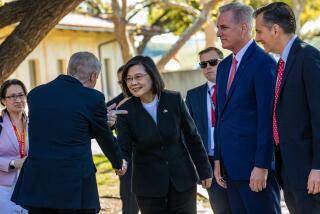Taiwan Airlines to Fly to Mainland China
TAIPEI, Taiwan — For 10 days beginning late next month, Taiwan-based airlines plan to operate flights to the Chinese mainland for the first time since the Communists took power in Beijing more than half a century ago.
The charter flights, which will bring home for the lunar new year holiday some of the estimated 1 million Taiwanese living on the mainland, are one more sign that economic imperatives are eroding political barriers that have separated the two adversaries for so long.
But the controversial nature of the initiative, its carefully limited scope and the debate about how the aircraft should be routed underscore how arduous the political journey remains before the two sides can establish normal trade, communications and travel across the Taiwan Strait.
Taiwan has had no direct links with the mainland since Nationalist Party leader Chiang Kai-shek established his government here in 1949 after fleeing the Communists. Beijing today views this island as a renegade province and counts its reunification with the mainland among its top political priorities.
Despite the political standoff, the attraction of China as one of the world’s preferred low-cost industrial production centers has led hundreds of Taiwanese companies to build factories and relocate staff there in recent years.
The charter flights were proposed last month by Nationalist Party legislator John Chang. All six Taiwanese airlines are eligible to fly the Shanghai-Taipei route, and under current plans, each would operate one round-trip flight per day. Although the flights will be run for less than two weeks, Chang argues that they are highly significant.
“It will help make people feel more confident, more comfortable about the idea of permanent direct flights,” said Chang, Chiang’s grandson and Taiwan’s former foreign minister.
Added a Taipei-based diplomat: “Taiwanese commercial planes on the ground in mainland China is important symbolically. It’s a precedent.”
The charter flights were envisioned as a convenient way to ease the crush of lunar new year travel, which has grown steadily in volume. With no regular direct commercial flights, travelers must change planes in Hong Kong or Macao. It is an ordeal that turns what would be a 90-minute flight from Shanghai to Taipei into a six-hour odyssey.
However, Taiwanese domestic political wrangling seems likely to eliminate most potential gains in convenience and speed. The Taiwanese government has insisted that the planes still stop briefly in Macao or Hong Kong for a “security check.” The only difference from a scheduled commercial flight, officials admit, is that passengers won’t have to switch aircraft.
Tsai Ing-wen, chairwoman of Taiwan’s Mainland Affairs Council, said direct flights required a special resolution passed by parliament, which is deeply divided on the issue.
Chang complained that the stops are “totally unnecessary” and nullify much of the charters’ benefits. He suggested that the planes make touch-and-go landings, in which the planes would spend only a few seconds on the runway before taking off again.
Progress has been equally painstaking in other areas of cross-strait relations.
When China and Taiwan joined the World Trade Organization nearly a year ago, there was hope that the move would result in diplomatic contacts that could serve to build the trust needed for bolder political initiatives. After all, trade between the two totals about $30 billion a year, despite the lack of direct contacts.
Instead, the two spent much of the year sparring over whether Taiwan’s representation at the WTO’s Geneva headquarters should be called a mission or an office. The first official contact between representatives came only this month, and that took place in a carefully chosen neutral venue: a Geneva hotel.
“At least we got it started,” Tsai said.
Trade and transportation links established two years ago between the mainland and Taiwan’s small outer islands of Quemoy and Matsu remain intact, but they have failed to generate the hoped-for trade volume, Taiwanese officials said.
With Beijing still apparently unwilling to deal with Taiwanese President Chen Shui-bian, whose party has anti-unification sympathies, analysts expect no major breakthrough in relations before the island’s presidential election in March 2004.
“Maybe some incremental steps to ease things for the business community, but nothing major,” summed up a Western diplomat.
More to Read
Sign up for Essential California
The most important California stories and recommendations in your inbox every morning.
You may occasionally receive promotional content from the Los Angeles Times.










